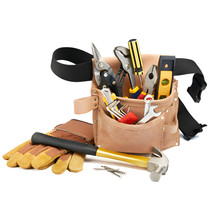25th Apr 2025
Best Hand Tools for DIYers vs. Professional Mechanics
Summary
Whether you’re experimenting in your garage to complete that passion project or are a full-time professional, there’s one thing that’s certain: correct hand tools make all the difference.
The right tools give you the convenience of completing your project along with the finish and satisfaction. However, not all tools are made equal. If you’re a professional working with DIYers, you’re bound to face problems in operation.
Similarly, while professional mechanics require durability, accuracy, and efficiency to keep up with daily heavy use, do-it-yourselfers give top priority to flexibility and cost.
Therefore, in this blog, we understand the role of DIYers vs. professional mechanics to help you confidently create (or improve) your toolkit. Let's investigate the best hand tools for both do-it-yourselfers and professional mechanics.
Understanding the Differences: DIYers vs. Professional Mechanics
Before we understand more about the individual tools, it’s important to understand the primary difference between DIY and professional mechanics:
DIYers: They’re a great fit to work on hobbies, little projects, or sporadic repairs. These tools are flexible and economical. Tools that have several uses and do not always demand industrial-grade durability are often valued by do-it-yourselfers.
Professional Mechanics: These machines are designed to work regularly on challenging tasks, strict deadlines, and different equipment. They’re reliable tools and help run a business.
Sounds confusing, right? Let’s get a clear understanding of both the tools in this section:
1. Wrench Sets
For DIYers:
A simple set of combination wrenches, including box-end and open-end tools, is more than adequate. Companies like Fowler Precision Ratchet Sets provide reasonably priced, sturdy choices with good ergonomics. However, while at it, choose a metric and SAE that will cover most house or car tasks.
For Professionals:
Pros should make investments in high-end sets such as the Mitutoyo or Fowler torque wrenches' professional line. These give longer lifespans, better tolerances, and more torque. In confined areas, ratcheting wrenches save time; this is a revolutionary development in crowded stores.
Key Takeaway:
The main lesson is that professionals need high performance and endurance; DIYers gain from adaptability.
2. Socket Sets
For DIYers:
For do-it-yourselfers, a 40–50 piece socket set with both shallow and deep sockets is ideal. Companies like Starrett, screwdrivers or layout tools have reasonably priced starting kits. For broad application, choose a 3/8-inch drive set with metric and standard sizes.
For Professionals:
Pros should tackle heavy-duty jobs with thorough sets including impact sockets and numerous drive sizes (1/4”, 3/8”, 1/2’s). For quality materials resistant to wear under continuous impact wrench usage, think of names like SPI.
Key Takeaway:
Professionals executing demanding tasks without losing efficiency require complete protection and a robust steel structure.
3. Screwdrivers
For DIYers:
A multi-bit screwdriver is an affordable and space-saving fix. Today, we have multiple brands that provide flexible choices for modest vehicle maintenance and home repairs.
For Professionals:
Professionals require ergonomic grips and magnetic tip precision-machined screwdrivers. Premium screwdrivers are a great tool to stop stripping and improve torque control.
Key Takeaway:
While experts need accuracy and durability, DIYers are designed for ease and convenience.
4. Pliers
For DIYers:
A simple set of slip-joint pliers, needle-nose pliers, and cutting pliers covers most fundamental chores. The market is filled with multiple brands that allow you to buy sturdy pliers without going broke.
For Professionals:
Professional mechanics often require a complete set - hose clamp pliers, linesman pliers, and locking pliers. These experts rely on brands that offer self-locking grips and induction-hardened cutting blades.
5. Torque Wrench
For DIYers:
A click-style torque wrench is sufficient for occasional use, especially for tire changes or engine work. Tekton offers affordable models with reliable accuracy.
For Professionals:
Precision matters — opt for digital torque wrenches from brands like Snap-On or CDI. These offer superior accuracy, essential for torque-critical applications in professional settings.
Key Takeaway:
Professional-grade torque wrenches ensure compliance with manufacturer specifications, minimizing liability.
6. Hammers
For DIYers:
A simple claw hammer or ball-peen hammer covers most tasks. Look for fiberglass or wood handles for vibration-dampening.
For Professionals:
Mechanics often require a soft-face dead blow hammer and a heavier ball-peen hammer. Brands like Estwing or Trusty-Cook provide shock-resistant and durable options for heavy-duty use.
Key Takeaway:
Pros need shock absorption and durability for daily striking force.
7. Allen (Hex) Wrench Sets
For DIYers:
A folding hex key set is compact and convenient. Bondhus offers durable sets that are perfect for assembling furniture or light mechanical work.
For Professionals:
Full-length T-handle hex keys provide better leverage and comfort for repetitive tasks. Professionals benefit from ball-end hex wrenches, which allow fastening at an angle.
Key Takeaway:
Professional mechanics need ergonomic designs and full sets for automotive assemblies.
8. Pry Bars
For DIYers:
Basic 2-piece pry bar sets are sufficient for home or auto tasks like removing trim or separating components.
For Professionals:
Mechanics benefit from a heavy-duty set with angled tips and high-leverage designs. Brands like Mayhew offer professional pry bars that withstand rigorous prying and lifting tasks.
Key Takeaway:
Durability and leverage are crucial for pro-grade pry bars.
Factors to Consider When Choosing the Best Hand Tool Brands
- Quality: The quality of your tools is a major concern. Your tools should be made of tough materials like forged steel and high-quality alloys to endure intensive use and maintain their integrity over time. Look for firms that are recognized for their dedication to quality craftsmanship, just like Penn Tool Co. has been for years.
- Price: Hand tools are available at a variety of price points, from low-cost solutions to luxury names. Consider your requirements and budget. If you're a casual DIYer, a decent value bundle can be plenty. Professionals who rely on their equipment on a daily basis would most likely profit from investing in high-quality products.
- Functionality: Consider the types of projects you'll be undertaking. Do you need a general-purpose toolbox, or will you need specialist tools for certain tasks? Choose manufacturers that provide a wide range of tools or excel in certain areas you want.
- Ergonomics: A pleasant grip and well-balanced design are critical for decreasing fatigue and avoiding injuries. Look for tools with ergonomic handles that match your hand size and give the best control.
- Warranty: A good warranty shows that the manufacturer is confident in the quality of their goods. Look for brands with extensive warranties to provide your peace of mind and protection against unanticipated faults.

